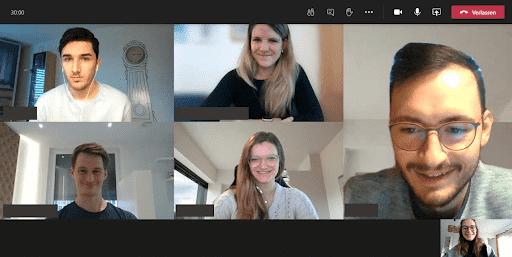






As people around the world become increasingly aware of societal and environmental issues, brands and employers take steps to address these concerns.
They review their supply chains, check their environmental footprint, implement policies for better work life balance, and partner with nonprofits. Although corporate partnerships like these aren't new, they are gaining momentum as more companies realise their high value.
In the Corporate-NGO Partnerships Barometer 2020, nearly all participants (98%) said they believed these partnerships have made corporates better understand ESG issues. In addition, they were effective in raising funds and helped improve reputation and business practices. Take the example of L'Oréal. In their yearly "Citizen Day" volunteering week, they can motivate 200 employees to take part in activities like clean-ups, meal preparations, building houses for people in need, and more. All while taking care of the costs for material and catering.
Seeing companies' enthusiasm for collaboration and the effectiveness of these projects, more and more nonprofits are teaming up with corporates.
In this guide, you will learn about the various types of corporate partnerships, what makes them successful and how to get started.

In a corporate partnership, a nonprofit receives funds, goods, or services in exchange for something the corporate partners see as beneficial for their business or just as part of giving back to the community.
In their various forms, corporate partnerships leverage a company's strengths in favour of the nonprofit's beneficiaries.

Partnering with a corporate can make a significant difference for a nonprofit.

Depending on the type of partnership it can provide...
Financial support and a steady flow of funds to secure current programs or start tackling larger projects
New advocates and an expanded supporter base (more donors and more volunteers)
Recognition, awareness, and media coverage about the nonprofits themselves and their cause
Access to pro bono expertise for different departments in a nonprofit, from fundraising to IT support or marketing
Network opprtunities with other partnered nonprofits
Mehr erfahren
So here are some facts and stats that will help you win them over.
1. Increase revenue
Research shows that social investments, like partnerships with nonprofits, can deliver up to a 6% increase in share price and a 20% increase in sales.

Today, buying decisions are 60% based on brand image. And ethical values are increasingly important as 81% of millennials want companies to be good corporate citizens.
3. Attract new talent
Employees today are looking for meaningful work experiences. One study found that 79% of adults consider a company's mission before applying.

Purpose-driven employees show higher levels of well-being and 4x higher levels of engagement in the workplace.
5. Increase productivity
Volunteering together promotes collaboration and communication across teams and will bring an overall boost in morale and engagement.
“Society is calling out for everyone to play their part in supporting those most in need. Nonprofits have the opportunity to ensure every company can develop a positive purpose, aside from commercial goals.”

Corporate partnerships can take various forms. Several are conducted as a simple donation, whereas others are more engaging and collaborative, involving developing solutions and committed stakeholders.

.
In a corporate sponsorship, a business sponsors a particular program or event in exchange for having its logo, signage, or other marking material displayed.
The engagement in this type of partnership is low, making it a good choice for companies with little time or resources. Look at a company's mission and target audience to find a good match.

Sponsorships are usually connected to specific projects. Therefore, having a good idea of your nonprofit's budgetary needs is crucial if you won't be able to use the contributions from your sponsor in other projects.

Organizing sports events is a good way of raising awareness and funds at the same time, which makes them a popular option for corporate sponsorships.
Marathons, for example, attract people who want to set a challenge for themselves and do some good along the way.
Alternatively, some marathons also offer special places for people signing up via a nonprofit to raise funds, like the Virgin Money Marathon in London.


Grants are financial do purpose (unrestricted precisely how the fund

Who to partne
Companies from all kin find corporates and th
A grant is closer to an i proposal and report la proposals, so plan for i



rt with the company's employees. After will present the same or double the amount g the initial donation.
re of an effort on the corporate's side ver, it also generates a higher return when it th an experienced CSR and HR department
y established a matching gifts initiative, and by joining their existing program.


Here, instead of a financial contribution, the company might offer services or pro
Start by thinking about what goods or services would help save resources and pu organisation s mission. For example, if you work at a soup kitchen, you could par companies producing disposable plates or collaborate with supermarkets and re reduce food waste. You might not get all the donations you need, but even a sma contribution can pave the way to long-lasting corporate partnerships.
When pursuing in-kind donations, organisations must be mindful of logistics and costs. However, some international organisations already have a system to send contributions to the areas where they are needed.


Save the Children Switzerland is working with their partners in the asylum sector to provide refugee children with a safe space to be children again. As this requires lots of material for learning and playing, the nonprofit reached out to corporates with a clear suggestion for an activity:

Come together as a team to build a "Learn & Play Cart".
The organisation gave clear instructions about what to include and invited the contributors to a Learn and Breakfast session to hear more about Save the Children's cause and projects.

Employees volunteer hours to help a nonprofit with everyday activities like packing food bags, cleaning a beach, or serving meals at a soup kitchen.

Corporates are most likely to use this kind of partnership for team building as it promotes collaboration and strengthens relationships. Look for companies that place a high value on company culture or start-ups with rapid growth.
The activities should be easy to do for anyone who wants to volunteer. To facilitate the process, prepare and test different activities or count on solutions like Alaya which has experience in creating activities to bring nonprofits and corporates together.
In this case, employees offer their expertise to provide a service that would benefit the nonprofit's management, like helping with financial planning, drafting a marketing or social media strategy, or translating a website.
This type of engagement represents an enormous saving and enables nonprofits to allocate resources to more pressing needs.

If you need specific help, you don't need to go to a business that only offers this service. An engaged partner company can help you across departments and even identify points of improvement you hadn't considered before.

To count as a corporate partnership, this option needs a corporate policy for employees to follow. Otherwise, it's simply individuals helping out nonprofits. However, it's still beneficial to partner with a company to access a wider pool of knowledge. Corporates with an experienced CSR and HR department are more likely to already have a policy installed or are more likely to implement one quickly.
In 2020 employees from PwC Switzerland offered their creativity and expertise to 5 nonprofits in a hackathon like brainstorming day.

They came together in groups to work on specific challenges or opportunities these nonprofits faced. For example, expanding their finance strategy or preparing a business plan to expand their donor base.
Read the full story here.
“It was really interesting to get outsiders’ ideas. I believe that with these kinds of events, people not engaged in the nonprofit world may have a better understanding of the challenges we face.”




“A big thank you for organising this brainstorming activity with a fantastic team. We were impressed by the participants’ professionalism and appreciated their commitment and creativity. We hope that this collaboration can continue in the longer term.”
In this scenario, a company sells a product or service, with part of the proceeds going to the nonprofit. As a result, the business benefits from increased sales, and the nonprofit receives funds and visibility.
Types of cause marketing
Product sales: The company donates a percentage of the sales of a product. Point of purchase: A customer adds a donation at the store cashier, and stores give it to the nonprofit.

Licensing of the Nonprofit's Logo, Brand, and Assets: The nonprofit gives its partner the right to use its logo on products.

Just like with corporate sponsorships, it makes sense to go for companies with products and services or even company values close to your cause as a nonprofit.
With online retail shopping soaring, nonprofits should consider adapting the point of purchase to online purchase requests. Timing is also essential as employees might be too busy during high season, and product or services prices vary throughout the year.



It ensures long term success and explores ways in which both parties can benefit from achieving each other’s missions and shared goals.
It is based on shared values which are vital in developing innovative responses to and/or driving social change.

It is facilitated by regular and open communication to convey and agree on partnership expectations.
Time to build trust, respect, and understanding. A dedicated team with specific roles and responsibilities.
Frequent communication to share project updates and success indications.
Flexibility to adapt quickly to changes and unforeseen challenges on either side.

A significant number of partnerships between companies and NPOs have been formed worldwide in the past. What is the secret? How can NPOs increase the chances of having a successful collaboration? We've put together some valuable tips for every step of your process.
This first step is the foundation and guide for all of your subsequent efforts. Take some time to brainstorm and get opinions from your colleagues.
Determine what you ' re looking for in the partnership
Try answering these questions to identify the needs of your nonprofit
Which type of donation would make the most significant difference for your nonprofit?
Can you offer volunteering activities that don't require much training or supervision?

What level of donation or volunteering hours would be worth the investment and effort on your side?
For in-kind donations, do you have storage space for them?
What is non negotiable, and what would you need for the partnership to work?

Once you know what you’re looking for, start looking for your perfect corporate partner.
In this scenario, a company sells a product or service, with part of the proceeds going to the nonprofit. As a result, the business benefits from increased sales, and the nonprofit receives funds.

Look up organisations in your area.
Reach out to your board and volunteers who might have valuable contacts.

Take a look at the type of corporates other nonprofits of your fieldwork collaborate with.
Find their mission and vision on their website and see if they align with yours.
Read their annual report. You can find out a lot about their business and their priorities.
Check if they have a CSR policy and/or history of working with nonprofits. This can make the whole process easier.
Investigate if there has been any scandal or bad press around this company.
Take a look at the company's LinkedIn page. Who are the decision-makers? Do you have any connections in common?
To prepare your pitch to potential corporate partners, get a clear idea of who you are and why a company should partner with you. Then, make sure you personalise every proposal to every potential partner.
Define who you are and why you exist
When and why was your nonprofit created?
Be clear about your vision and mission
Share your theory of change to explain how your organisation will achieve its mission

Explain why you are a good match
Describe the value you can provide to your partner
Address potential concerns like community impact, accountability, impact reporting, and transparency around the use of funds
Provide a list of options for collaborative action.
Give detailed information about the potential impact, e.g., number of beneficiaries, regions positively affected, resources secured, etc.
If possible, share testimonials or impact reports from previous partnerships

Once you have green light for the partnership, it's time to get into the details. Good planning and organisation will facilitate a smooth collaboration both partners will like to repeat.
Define partnership objectives and expectations
Make sure to set realistic and SMART goals: Specific, Measurable, Achievable, Relevant and Time based.
Identify risks (technical, environmental, economic, political, etc.)
Take some time to consider worst case scenarios and how to manage crises.
Align external communication strategies

Corporates are likely to have clear guidelines for their public communications, be sure to get familiar with them.

Commit to cultivating relationships and communicating with your contacts. Don't fall into the trap of only contacting them asking for help but treat them as strategic partners with a shared mission. Here are some best practices.
Personalize communications
Be sure to give your partner the VIP treatment and don't just add them to your automated email lists.
Schedule in-person meetings and visits
Whenever possible, meet in person (or virtually!). This will not only help any organisational process, but it will also establish long lasting relationships.

Invite employees to your events
Meet-ups, fundraisers, workshops,... there are many opportunities to invite the employees of your corporate partner.

After completion of every project or after receiving a donation, communicate the impact it had and be sure to express your gratitude to all contributors.

An impact report is likely to be required and also a good opportunity to share your story, strengthen existing partnerships and inspire new ones.
What to include:
A review of the impact against the set goals Highlights and challenges Personal stories from beneficiaries
Give thanks to every contributor
You might not have been in direct contact with every person involved, but make sure they know you appreciate their contribution and had a good experience with your organisation.
Get permission and approval from your corporate partner, and then give them a public shoutout, including highlights and achievements from your partnership.




Benevity, ein zertifizierte B Corp Unternehmen, ist führender Anbieter einer globalen Corporate Purpose Software, der einzigen integrierte Lösung, die Employee und Customer Engagement und Investitionen in die Community vereint. Benevity war Finalist bei den Fast Company's 2020 World Changing Ideas Awards. Die Cloud Lösungen von Benevity unterstützen viele bekannte Marken dabei, Mitarbeitende zu motivieren, zu binden und zu engagieren, um einen positiven Einfluss auf die Gesellschaft zu haben. Mit der Software, die in 22 Sprachen verfügbar ist, hat Benevity fast 8 Milliarden Dollar an Spenden und

gemeinnützige Organisationen weltweit zu unterstützen. Benevity hat außerdem dazu beigetragen,
Millionen Stunden an freiwilliger Arbeit umgesetzt, um
Challenges durchzuführen und Finanzhilfen

Wert von
Milliarden US Dollar abzuwickeln. Weitere Informationen finden Sie unter benevity.com.